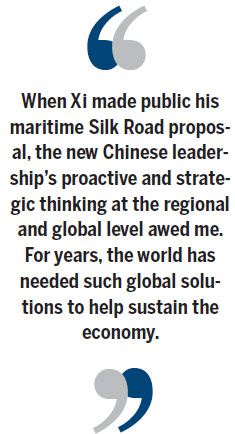A road by any other name
Updated: 2015-02-20 09:27
By Fu Jing(China Daily Europe)
|
|||||||||||
To boost China's connections with other regions, a simpler, direct name is needed
The extent to which China is understood by the world partly depends on the quality of translation of the complicated Chinese language into foreign tongues. But such work is always challenging, especially when translating the full meaning of simplified buzzwords and phrases into English.
The latest example is President Xi Jinping's initiatives of connecting Asia and Europe by borrowing the concept of the historic Silk Road. Xi proposed the Silk Road Economic Belt initiative in Astana, Kazakhstan, in September 2013 and the 21st Century Maritime Silk Road initiative the following month in Indonesia.
With these proposals being disseminated, comprehended and even partly made into reality by China and other countries, his team has condensed the two proposals into one expression, which is the One Belt and One Road Initiatives (in Chinese, literally yi dai yi lu).
Xi made public his Silk Road Economic Belt initiative shortly after the G20 summit in Russia in 2013, which I covered. China's efforts and joint contribution with emerging economies to deepen reform of the global financial system and establish the BRICS bank at the summit had already impressed me. But I also came away impressed by Xi's Silk Road idea because it shows China's growing awareness of shouldering more international responsibility.
When Xi made public his maritime Silk Road proposal, the new Chinese leadership's proactive and strategic thinking at the regional and global level awed me. For years, the world has needed such global solutions to help sustain the economy.
But very soon, I had realized it would be a difficult job to deliver such beautiful ideas to foreigners in their own language.
In a recent interview with Kevin Rudd, the former Australian prime minister, he frankly told me that he also thinks China will have a "communication challenge" explaining the strategic proposal to the rest of the world. Rudd, who speaks Chinese fluently, said the concept is very clear and what China is trying to do is to expand connectivity, which he calls an extension of the idea of the Association of Southeast Asian Nations.
Saying he supports the efforts in infrastructure construction and financial injections by setting up Silk Road fund, Rudd said the challenge for China is not so much the content of the proposal, but the communication of it. If you translate yi dai yi lu, or One Belt and One Road, directly into English, the challenge becomes clear, he says. It is an understandable concept in the Chinese framework, but when you use "belt" in English, people have to wonder what that's got to do with connectivity, apart from keeping your trousers on, he says.
Rudd has his own solution. He says China should call it "pan-Asian connectivity agenda."
However, I doubt the effectiveness of Rudd's solution among Europeans, who have been relatively slow in accepting these proposals. For a long time, Europeans, especially those in Western Europe, have had such a sense of superiority that it is hard for them to accept a pan-Asian idea, even though they badly need a way out of their economic stagnation.
I also discussed the communication challenge with Justin Lin, former World Bank chief economist and professor at Peking University, who says he thinks Africa certainly will be included in the One Belt and One Road Initiative.
I asked about his thoughts on the English expression of Xi's proposals. Thinking for a while, Lin, now also a top adviser for China's leadership, said the expression of "One Belt and One Road Initiative" can be used. He believes that gradually, people will understand and accept it.
But I am not convinced.
Such expression is simply a word-for-word translation of a condensed Chinese expression, which includes two proposals. In doing so, many meanings have been lost and even the commonly accepted, beautiful and peaceful idea of the Silk Road has dropped away.
So, in my understanding, when naming such combined proposals in English, we should abandon doing so by translating it word for word. If we are not tied to this rule, the options are many.
For example, we could name it the Modern Silk Road.
Or, if we're focusing on connectivity and infrastructure construction to connect the three continents, it could be called the Asia-Africa-Europe Infrastructure Plan.
But, of course, these ideas were first proposed by Xi Jinping, who has accumulated a huge amount of trust and respect as a result of his capable and strategic governance in reform, rule of law, fighting against corruption and diplomacy. The Silk Road proposals contain immensely significant economic and peaceful connotations for the three continents if they are more closely connected by rail, roads, maritime routes and digital means.
So, I suggest that the English expression for the One Belt and One Road Initiatives should be named Xi's Deal. Why not?
The author is China Daily chief correspondent in Brussels. Contact the writer at fujing@chinadaily.com.cn


(China Daily European Weekly 02/20/2015 page11)
Today's Top News
Austria on alert following Denmark terror attacks
Rouble's fall to hurt weather forecast: Meteorological center
S Korea top choice for Chinese holidaymakers
UN Security Council slams IS murders of 21 Egyptians
Danish police kill gunman suspected of shootings
Michele Ferrero, maker of Nutella, dies on Valentine's Day
Italy closes Libyan embassy
8th Europe-Ukraine Forum held
Hot Topics
Lunar probe , China growth forecasts, Emission rules get tougher, China seen through 'colored lens', International board,
Editor's Picks

|

|

|

|

|

|





